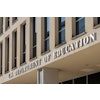Nunez Community College’s dismissal of professor Richard Schmitt was likely a retaliatory measure, violating his academic freedom, according to a recent investigative report by American Association of University Professors (AAUP).
The college dismissed Schmitt, a non-tenured associate professor with over two decades of service at the school, after he disagreed with the administration over the accuracy of an accreditation report to be given to the Southern Association of Colleges and Schools Commission on Colleges.
Nunez administrators provided no cause for the termination, but the AAUP investigating committee determined the administration’s actions violated Schmitt’s academic freedom, according to an AAUP release.
Schmitt was notified that his appointment would not be renewed during a conference call. AAUP officials argue that Schmitt was given no due process for contesting his dismissal, not given a dismissal hearing and given no reasons as to why the administration decided not to renew his contract.
Nunez Community College does not have a formal tenure system, and appoints its faculty and staff on one year or less contracts, which violates the commonly accepted academic standards arranged by the 1940 Statement of Principle on Academic Freedom and Tenure.
AAUP standards recognize Schmitt’s appointment to be with de facto continuous tenure because he served more than an acceptable probationary period. Schmitt should be dismissed only for cause or because of institutional financial need or program closures, the release.
Schmitt also served as program manager for general studies and was responsible for recording student learning outcomes. Nunez administrators hired a consultant to help with the creation of the SACSCOC required reports, but the consultant and Schmitt apparently disagreed about material used in the reports.
According to AAUP, Schmitt later emailed administrators and the consultant expressing his concerns about material he had collected for the report, and offered to resign as program manager. The administration accepted his resignation.
AAUP officials said that three weeks later, Schmitt noticed that documents that were to be sent to SACSCOC still had his name listed as the author, though he had not completed them. Schmitt asked for his name to be removed from the documents since he “had very little to do with” the report and he sought “neither credit nor accountability for reports that bear only vague resemblance to the documents” he had drafted.
The community college chancellor denied Schmitt’s request a week later.
AAUP’s Committee on Academic Freedom and Tenure will discuss at its June meeting whether to recommend that censure be imposed on the Nunez administration for substantial noncompliance with AAUP supported standards of academic freedom and tenure.









